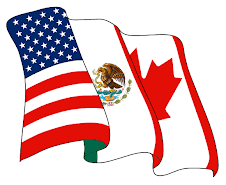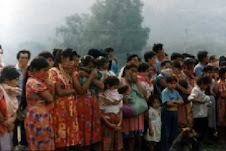Tuesday, November 27, 2007
Objectives of Transnational Feminist Analysis
The target population of women will be mexicanas who have worked in Mexican industry and have emigrated to the United States and worked there as well.
The "nexus" between US-Mexico trade is NAFTA. And a macro-scale analysis of NAFTA will provide insight into it's purposes and effects in both countries.
Nawal Saadawi's critique against the New World Order tactics will be used to prepare a transnational feminist analysis against NAFTA in recognizing it as another tool by the Global North that has exploited an economically weaker nation.
A criticism of the popular focus of 'maquiladora' workers in Mexico that potentially undermines an accurate analysis of NAFTA as a wholly national transnational analytic.
The lived reality of women that have worked in Mexico--not only in industry but in other sectors adversely affected by trade.
Agriculture plays a significant role in this approach because it is largely ignored as a consideration of trade.
Mexican migrant women living in the United States in different-yet-not-so-different realities than their previous state in Mexico.
___________________________________________________________________
forward march.
Monday, November 26, 2007
Exploitative Policies of Trade and Deprivation
wooderson316 (9 months ago) Show Hide Marked as spam
Is profit intrinsically bad? I mean if I make something innovative and new that has utility that people like and can use, is it not ok that I ask for more than just the cost of the items themselves and the cost of my time?
Strummerkid (9 months ago) Show Hide Marked as spam
Well when you come up with your innovative product you will need to have it [made]. Usually you will send your product overseas to be made. This economically depresses local workers as they lose their jobs. And the workers overseas find themselves working for you in conditions that are outright illegal in your own country. They cannot unionize, they barely make a living wage and they are routinely murdered when they try to unite and speak [out] against this.
__________________________________________________________________
In 1994, The North American Free Trade Agreement--an extension of the 1988 Canada-US Free Trade Agreement "opened" trade in North America to allow the easiest tariff-free movement of commodities between the countries of the United States, Canada and México. Since its inception to the present, NAFTA (as it is affectionately called) has incited mixed feelings that have pleased economists, corporations and workers, and scandalously enraged people of all three countries of which it is a part. NAFTA has become yet another of the many international organizations and treaties that pit richer, powerful countries against weaker, less-developed ones that has created dire consequences and circumstances for women in México and the United States who feel the brunt of the "free trade" policies.
A brief North American history of colonization
The colonization of North America can be distinguished in the US and Canada from México, in that British colonizers generally eliminated indigenous populations or drove them out of colonized territory. In the Spanish America's, peninsulares forced the indigenous peoples to work lands for crop cultivation, ore-mining and to convert to christianity.
In the United States, revolutionaries rebelled against their native country, while still maintaining the same cultural traditions and began their own government. In Canada, the region became a protectorate of the British empire, gaining economic sustenance with the timber industry, gaining their independence in the twentieth century.
In México, American-born Spaniards (criollos) and mixed-race Mexicans (mestizos) banded together against the European-born Spaniards (peninsulares) to gain their independence. However, shorty after independence, the self-proclaimed emperor Agustin de Iturbe, was murdered after exercising authoritarian force. After decades of dictatorial rule, followed by momentary democratic government and then more years of dictatorial rule in which México lost over a third of its lands to the United States and amassed a large debt, the instability in this country created an environment so unmanageable that for the next century (from the 1890's to the 1950's) American intervention in México, such as the occupation of Veracruz, México or the refusal to recognize the government pending property ownership after the Mexican revolution, served only to further the disintegration of Mexican autonomy.
During the 1950s, when international organizations began forming that began recognizing the need to create an international global community (largely as a response to the the global communist threat) policies began forming to improve trade relations between the US and México. Nawal Saadawi identifies the World Bank, the International Monetary Fund and the World Trate Organization, as well as other international organizations run by wealthy nations as facilitators of predatory global trading policies that further cripple already weakened nations into submission of policies and trade tactics that only continue to ruin them.
In México, women have borne the brunt of the "free trade" tactics, and in border towns such as Ciudad Juárez, México, on the border with El Paso, Texas the mass killing of women near factories and deserts exceeding 400 deaths, where even corrupt law enforcement cannot catch up to the growth in urban sprawl created by the perception of jobs in the textile industry that are never vacant, has created international recognition of the dangers of globalization.
In these blogs, it is not the intent to focus solely on the killings of Ciudad Juárez as a result of the sprawl created by the infamous "maquiladoras". However, it is important to recognize this situation as the most clear and obvious demonstration of the devastating effects on women. Part of this analysis is to recognize that the importance given to the so-called "maquila" problem can create conflict with transnational feminist theory by identifying a situation in which American Western feminist scholars speak on behalf of Mexican women in a manner that mis-identifies the violence against women.
An argument will be made that NAFTA has a larger effect against agriculture and manufacturing that affect both American women as well as Mexican women. For the last twenty-plus years, the argument in favor of globalization and the concepts of "free trade" have blindfolded both rich and poor nations into believing that everyone is gaining and that everyone is helping one another towards global advancement. As far as trade policies go, women lose out not only economically and politically, but also on their lives.








